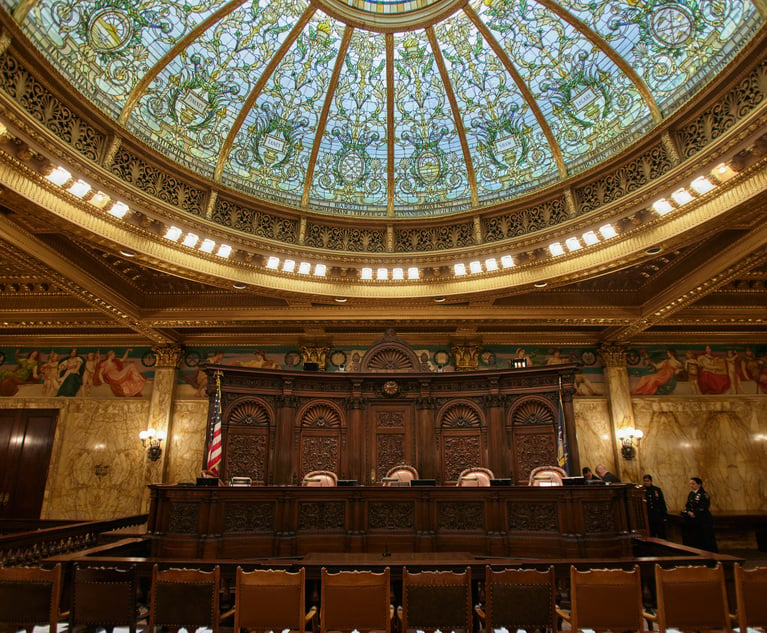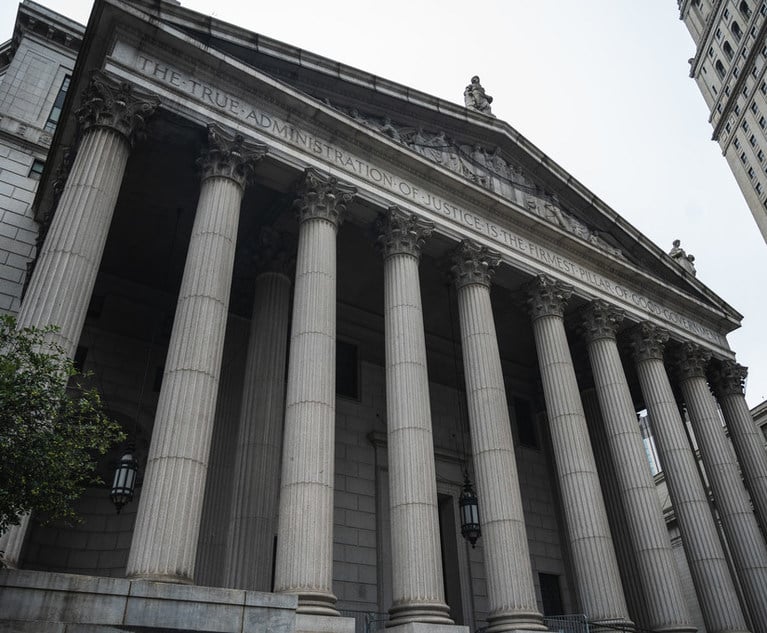CFTC's New Penalty Guidance: Relief From 'Piling On?'
In his Corporate Crime column, William F. Johnson explores the Commodity Futures Trading Commission's new guidance outlining factors the Division of Enforcement will consider in recommending civil monetary penalties to be imposed in enforcement actions.
July 01, 2020 at 12:14 PM
12 minute read
 William F. Johnson
William F. Johnson
On May 20, the Commodity Futures Trading Commission (the CFTC or the commission) issued—for the first time since 1994—new guidance outlining factors the Division of Enforcement will consider in recommending civil monetary penalties to be imposed in enforcement actions (hereinafter, the May 2020 guidance). In releasing this guidance, the CFTC stressed its commitment to clarity and transparency in its enforcement practices, in an effort to simultaneously be fair and tough in light of the rise of commodities-related enforcement actions. The new guidance continues the CFTC's trend toward formalizing its practices, as evidenced by the creation of an enforcement manual just last year, which has now been updated to reflect the May 2020 guidance. In a welcome move seemingly designed to minimize the "piling on" of remedies in matters involving multiple regulators, the May 2020 guidance states that the CFTC will account for the remedies and relief in parallel cases involving criminal authorities and other regulatory entities.
CFTC Penalties and May 2020 Guidance
The CFTC is tasked with detecting, investigating, and prosecuting violations of the Commodity Exchange Act (the act) and regulations promulgated thereunder. The act authorizes civil monetary penalties for each violation, and it sets a maximum penalty per violation. See Sections 6(c)(10), 6b, and 6c(d) of the Act, 7 U.S.C. §§ 9(10), 13a, 13a-1(d) (2018). Although the act and prior CFTC guidance mandate that penalties be assessed in relation to the gravity of the violation, see, e.g., Sections 6(e)(1), 6b of the Act, 7 U.S.C. §§ 9a(1), 13a (2018), both the 1994 guidance and the May 2020 guidance establish additional factors to be weighed.
The May 2020 guidance lists three factors as a framework through which the Enforcement staff will evaluate a penalty to recommend to the commission: the gravity of the violation; specified mitigating and aggravating circumstances; and other considerations. The guidance also sets forth sub-factors for each item in this list. Mem. from James M. McDonald, Director, Division of Enforcement, to Division of Enforcement Staff, "Civil Monetary Penalty Guidance" (May 20, 2020); see also "CFTC Division of Enforcement Issues Civil Monetary Penalty Guidance," Commodity Futures Trading Commission press release (Washington, D.C., May 20, 2020); Commodity Futures Trading Commission Division of Enforcement, Enforcement Manual (May 20, 2020).
The "mitigating and aggravating circumstances" factor stands out because it is the only one not previously reflected in the CFTC's 1994 guidance. CFTC Policy Statement Relating to the Commission's Authority to Impose Civil Money Penalties, (1994 Transfer Binder) Comm. Fut. L. Rep. (CCH) ¶ 26,265 (Nov. 1, 1994). The May 2020 guidance lists the following considerations for this factor:
Post-violation conduct, including:
- mitigating conduct, such as attempts to cure, return of victim funds, or efforts to improve a compliance program; and
- aggravating conduct, such as concealment or obstruction of an ongoing investigation;
- Whether the respondent self-reported the misconduct, as well as the extent of cooperation and remediation, as detailed in the Division's Enforcement Advisories;
- Timeliness of remediation;
- Existence and effectiveness of the company's preexisting compliance program;
- Prior misconduct, such as whether the respondent is a recidivist; Pervasiveness of misconduct within the company, including responsibility of management; and
- Nature of any disciplinary action taken by the company with respect to the individuals engaged in misconduct.
'Piling On'
Perhaps the most notable feature of the May 2020 guidance is contained within the "Other Considerations Factor." There, the guidance states for the first time that the CFTC will take into account the "total mix of remedies and monetary relief" in the CFTC's action as well as the "remedies and relief to be imposed in parallel cases involving criminal authorities (including incarceration), other regulatory entities, or self-regulatory organizations."
If the CFTC means what it says, this new sub-factor would be a welcome development. The express reference to the "total mix" of penalties seems to be an acknowledgement of the "piling on" phenomenon, or the risk of excessive penalties in parallel enforcement actions with multiple regulators. By addressing this issue expressly, the CFTC appears to be joining the U.S. Department of Justice (the DOJ), which announced its own "piling on" policy in March 2018, recommending consideration of the totality of penalties imposed by the DOJ and other law enforcement agencies or regulators in parallel actions. "Policy on Coordination of Corporate Resolution Penalties" (May 9, 2018). The Securities and Exchange Commission (SEC) does not (yet) have similar explicit guidance.
The CFTC's Director of Enforcement, James M. McDonald, has previously acknowledged the commission's stance on "piling on" in discussing parallel FCPA investigations: "[W]e will not pile onto other existing investigations … To the extent the CFTC brings an action that includes a monetary penalty, we will ensure that our penalty appropriately accounts for any imposed by any other enforcement body. And when the CFTC imposes disgorgement or restitution, we will give dollar-for-dollar credit for disgorgement or restitution payments in connection with other related actions." "Remarks of CFTC Director of Enforcement James M. McDonald at the American Bar Association's National Institute on White Collar Crime," Commodity Futures Trading Commission Public Statements and Remarks (March 6, 2019). The continued increase in regulator collaboration in recent years highlights the need for express consideration of the total mix of remedies imposed. For example, in July 2018, the SEC and CFTC published a memorandum of understanding outlining coordination in areas of common regulatory interest. "Memorandum of Understanding Between the U.S. Securities and Exchange Commission and the U.S. Commodity Futures Trading Commission Regarding Coordination in Areas of Common Regulatory Interest and Information Sharing" (June 18, 2018).
Despite an increase in collaboration between the CFTC and SEC, resolutions in which total remedies are expressly adjusted to account for their combined effect remain uncommon (and no CFTC settlement announced since the May 2020 guidance was issued makes express mention of an SEC resolution as a factor). In the two years since the July 2018 memorandum of understanding between the CFTC and SEC, the agencies have brought five parallel enforcement actions, and only coordinated (as to penalties) on two involving individuals. In cases where there was no express acknowledgement that multi-agency penalties were a factor, it is possible that the agencies coordinated in private to seek penalties in separate, lower amounts that would total a desired combined amount, but the resolutions and accompanying announcements are silent on that issue. These resolutions are summarized below:
Amrit J.S. Chahal (2018)
Chahal was charged in connection with a fraudulent investment scheme, both criminally by the U.S. Attorney's Office for the Eastern District of Virginia, and civilly by the CFTC and SEC. In the criminal case, Chahal pleaded guilty, was sentenced to a prison term of 30 months followed by three years of supervised release, and was ordered to pay forfeiture of $1,232,510 and restitution of $445,633. In his settlements with the SEC and CFTC, Chahal's disgorgement obligations to pay $1,232,510 were deemed satisfied by the forfeiture order against him in the criminal case. United States v. Amrit Jaswant Singh Chahal, Case No. 1:18-cr-00152-LMB (E.D. Va. 2018); SEC v. Amrit J.S. Chahal, Case No. 1:18-cv-00426 (E.D. Va. June 21, 2019) (final judgment); CFTC v. Amrit Jaswant Singh Chahal, Case No. 1:18-cv-00422 (E.D. Va. June 21, 2019) (consent order).
1Broker (2019)
1Broker settled charges of selling securities without meeting discretionary investment thresholds required by federal law. Although the CFTC and SEC settlements were announced simultaneously, 1Broker was liable for two separate penalties: $990,000 to the CFTC (including certification that 1Broker repaid $570,000 worth of bitcoins to U.S. customers) and $53,000 to the SEC. Neither settlement expressly recognized the penalty that was paid to the other agency. See SEC v. 1Pool Ltd., Case No. 1:18-cv-02244 (D.D.C. Mar. 4, 2019) (final judgment); CFTC v. 1Pool Ltd., Case No. 1:18-cv-02243 (D.D.C. Mar. 4, 2019) (consent order).
Options Clearing Corporation (2019)
Options Clearing Corporation settled charges of failure to implement policies to manage risks as required by U.S. law and SEC and CFTC rules. The monetary penalties imposed by the SEC and the CFTC were separate—$15 million to the SEC and $5 million to the CFTC. Neither order expressly recognized the payment made to the other agency. In re Options Clearing Corp., SEC Admin. Proceeding No. 3-19218 (June 25, 2019); In re Options Clearing Corp., CFTC Docket No. 19-19 (Sept. 4, 2019).
XBT Corp (2019)
XBT Corp settled charges with the SEC and CFTC relating to failure to register security-based swaps using bitcoins and failure to register as a futures commission merchant. The simultaneous settlements imposed separate penalties of just under $132,000 to the SEC and $100,000 to the CFTC. Neither the SEC nor CFTC order mentioned payment to the other agency. In re XBT Corp SARL d/b/a First Global Credit, CFTC Docket No. 20-04 (Oct. 31, 2019); In re XBT Corp Sarl d/b/a First Global Credit, SEC Admin. Proceeding No. 3-19592 (Oct. 31, 2019).
Timothy J. Atkinson, et al. (2019)
Atkinson, his former business partner, and their former business entity all settled charges with the SEC and CFTC involving a scheme to fraudulently induce investments in binary options. The SEC's judgment provided that the disgorgement ordered against each defendant was to be offset by any disgorgement ordered against that defendant in the related CFTC case. SEC v. Atkinson, et al., Case No. 1:18-cv-23993 (June 5, 2019) (final judgment); CFTC v. Atkinson, et al., Case No. 1:18-cv-23992 (May 22, 2019) (consent order).
These cases illustrate that the CFTC and SEC collaborate in their parallel investigations, but they do not always make express reference to consideration of the combined effect of multiple remedies in their penalties (at least with regard to entities). Perhaps the CFTC's May 2020 guidance will change that. The fact that the DOJ has coordinated on penalties with entities after adopting its own "piling on" policy signals hope for such a change. As just one example, the DOJ and the CFTC announced parallel settlement agreements with Tower Research Capital LLC in November 2019 in connection with a spoofing scheme. As part of its deferred prosecution agreement, Tower Research agreed to pay the DOJ $67.4 million in criminal monetary penalties, criminal disgorgement, and victim compensation. The DOJ counted toward the criminal monetary penalty and criminal disgorgement any payments made to the CFTC, which had imposed a $24.4 million civil penalty. In re Tower Research Capital LLC, CFTC Docket No. 20-06 (Nov. 6, 2019); United States v. Tower Research Capital LLC, Case No. 19-cr-819 (S.D. Tex. Nov. 6, 2019).
In addition, the May 2020 guidance's emphasis on the value of cooperation, self-reporting, and resolutions with other regulators extends the guidance previously issued on those factors by the CFTC's Enforcement Division in 2017 and 2019. "CFTC Enforcement Advisory: Cooperation Factors in Enforcement Division Sanction Recommendations for Companies" (Jan. 19, 2017); "CFTC Enforcement Advisory: Advisory on Self-Reporting and Cooperation for CEA Violations Involving Foreign Corrupt Practices" (March 6, 2019).
Key Takeaways
The enforcement actions noted above underscore the need for true transparency in the CFTC's penalty calculations, particularly when payment of multiple penalties to different agencies is coordinated to avoid the "piling on" effect. Now that the DOJ and CFTC have issued policies describing express consideration for "piling on," it is time for the SEC to follow suit.
However, as the CFTC itself acknowledges, the newly issued guidance is merely written confirmation of its previous statements and practices. The CFTC's emphasis of the fact-sensitive nature of these penalty calculations somewhat diminishes the true utility of its guidance: "Each of these factors may be more or less relevant to the facts and circumstances of a particular matter and the type of violation at issue." Full transparency would necessarily include insight into how the CFTC calculates the exact amount of the penalty, as well as how a penalty figure is derived when the CFTC coordinates with another regulator in a parallel investigation. Despite the CFTC's May 2020 guidance and Director McDonald's March 6, 2019, statement regarding "piling on," recent enforcement actions fail to shed much light on how the CFTC ultimately decided penalty amounts in parallel investigations.
As a result, practitioners should not expect much to change in the CFTC's treatment of penalties, although it is generally a step in the right direction to see the agency formalize its practices and stress transparency. Only time will tell if the CFTC's recent penalty guidance will yield more settlements that expressly account for penalties from other regulators, which could incentivize individuals and entities to resolve more cases. In the meantime, practitioners should encourage clients to incorporate the CFTC's May 2020 Guidance into their compliance training, continue to explore cooperation and self-reporting, and utilize the newly issued guidance in discussions with the CFTC to seek settlement terms that expressly account for and reference penalties paid to other regulators.
William F. Johnson is a partner in the special matters and government Investigations practice group at King & Spalding. Associate Kimberly A. Wade assisted in the preparation of this article.
This content has been archived. It is available through our partners, LexisNexis® and Bloomberg Law.
To view this content, please continue to their sites.
Not a Lexis Subscriber?
Subscribe Now
Not a Bloomberg Law Subscriber?
Subscribe Now
NOT FOR REPRINT
© 2025 ALM Global, LLC, All Rights Reserved. Request academic re-use from www.copyright.com. All other uses, submit a request to [email protected]. For more information visit Asset & Logo Licensing.
You Might Like
View All
Decision of the Day: Judge Sanctions Attorney for 'Frivolously' Claiming All Nine Personal Injury Categories in Motor Vehicle Case


Decision of the Day: Trial Court's Sidestep of 'Batson' Deprived Defendant of Challenge to Jury Discrimination

Decision of the Day: Commercial Division Finds Defendant Engaged in Unfair Competition Against Plaintiff
Law Firms Mentioned
Trending Stories
- 1Eight Years On, A&O Shearman’s Fuse Legal Tech Incubator is Still Evolving
- 2Google Makes Appeal to Overturn Jury Verdict Branding the Play Store as an Illegal Monopoly
- 3First Amendment Litigator Returns to Gibson Dunn
- 4In Record Year for Baker Botts, Revenue Up 11.8%, PEP Up 17.6%
- 5Loopholes, DNA Collection and Tech: Does Your Consent as a User of a Genealogy Website Override Another Person’s Fourth Amendment Right?
Who Got The Work
J. Brugh Lower of Gibbons has entered an appearance for industrial equipment supplier Devco Corporation in a pending trademark infringement lawsuit. The suit, accusing the defendant of selling knock-off Graco products, was filed Dec. 18 in New Jersey District Court by Rivkin Radler on behalf of Graco Inc. and Graco Minnesota. The case, assigned to U.S. District Judge Zahid N. Quraishi, is 3:24-cv-11294, Graco Inc. et al v. Devco Corporation.
Who Got The Work
Rebecca Maller-Stein and Kent A. Yalowitz of Arnold & Porter Kaye Scholer have entered their appearances for Hanaco Venture Capital and its executives, Lior Prosor and David Frankel, in a pending securities lawsuit. The action, filed on Dec. 24 in New York Southern District Court by Zell, Aron & Co. on behalf of Goldeneye Advisors, accuses the defendants of negligently and fraudulently managing the plaintiff's $1 million investment. The case, assigned to U.S. District Judge Vernon S. Broderick, is 1:24-cv-09918, Goldeneye Advisors, LLC v. Hanaco Venture Capital, Ltd. et al.
Who Got The Work
Attorneys from A&O Shearman has stepped in as defense counsel for Toronto-Dominion Bank and other defendants in a pending securities class action. The suit, filed Dec. 11 in New York Southern District Court by Bleichmar Fonti & Auld, accuses the defendants of concealing the bank's 'pervasive' deficiencies in regards to its compliance with the Bank Secrecy Act and the quality of its anti-money laundering controls. The case, assigned to U.S. District Judge Arun Subramanian, is 1:24-cv-09445, Gonzalez v. The Toronto-Dominion Bank et al.
Who Got The Work
Crown Castle International, a Pennsylvania company providing shared communications infrastructure, has turned to Luke D. Wolf of Gordon Rees Scully Mansukhani to fend off a pending breach-of-contract lawsuit. The court action, filed Nov. 25 in Michigan Eastern District Court by Hooper Hathaway PC on behalf of The Town Residences LLC, accuses Crown Castle of failing to transfer approximately $30,000 in utility payments from T-Mobile in breach of a roof-top lease and assignment agreement. The case, assigned to U.S. District Judge Susan K. Declercq, is 2:24-cv-13131, The Town Residences LLC v. T-Mobile US, Inc. et al.
Who Got The Work
Wilfred P. Coronato and Daniel M. Schwartz of McCarter & English have stepped in as defense counsel to Electrolux Home Products Inc. in a pending product liability lawsuit. The court action, filed Nov. 26 in New York Eastern District Court by Poulos Lopiccolo PC and Nagel Rice LLP on behalf of David Stern, alleges that the defendant's refrigerators’ drawers and shelving repeatedly break and fall apart within months after purchase. The case, assigned to U.S. District Judge Joan M. Azrack, is 2:24-cv-08204, Stern v. Electrolux Home Products, Inc.
Featured Firms
Law Offices of Gary Martin Hays & Associates, P.C.
(470) 294-1674
Law Offices of Mark E. Salomone
(857) 444-6468
Smith & Hassler
(713) 739-1250






